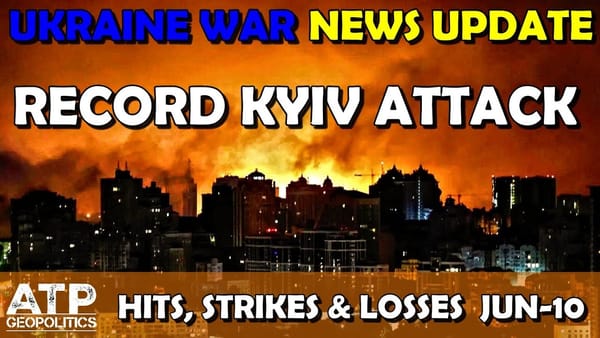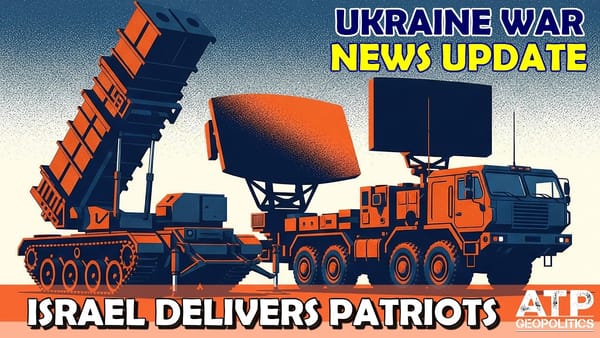Istanbul Talks: Outrageous Demands Again - Now What? Ukraine War Update NEWS
Table of Contents 📖
Hello Team
🎦 00:00-00:19⏩
Jonathan welcomes viewers to another ATP Geopolitics video, focusing on the latest Ukraine war news concerning the Istanbul negotiations between Ukraine and Russia, and other countries present.
Return to top⤴️
Istanbul Peace Talks: Initial Outcome and POW Deal
🎦 00:19-01:12⏩,01:47-01:51⏩,07:34-07:55⏩
Jonathan summarises the Istanbul talks as a "nothing burger," concluding that "not much has changed" and the outcome was similar to Istanbul 1.0, with no ceasefire. He notes that while a prisoner of war (POW) deal was achieved, the negotiations were not otherwise meaningful, feeling like a "massive waste of time again."
Return to top⤴️
Ukrainian Demands Regarding Abducted Children and Wounded POWs
🎦 01:12-01:47⏩
- President Zelensky's negotiators provided Russia with a list of nearly 400 abducted Ukrainian children, requesting their return. However, the Russian delegation only agreed to work on returning 10.
- Ukrainian officials prioritised the exchange of wounded and sick prisoners, as well as young soldiers aged 18 to 25.
- Russian officials confirmed they would swap all sick and wounded prisoners, with the exchange involving at least 1,000 POWs, mirroring a previous 1,000-for-1,000 swap.
Russian Demands for Ceasefire and Withdrawal from Occupied Regions
🎦 01:52-02:50⏩
- At the Istanbul meeting, Ukrainian officials reported that Russia rejected Kyiv's call for an unconditional ceasefire.
- The Russian state news agency RIA indicated Russia proposed two ceasefire options:
- One required Ukraine's complete withdrawal of its troops from the four Russian-occupied regions (Donetsk, Luhansk, Kherson, and Zaporizhzhia) within 30 days of a ceasefire.
- The second option was vaguely described as "a package containing a number of unspecified conditions."
- Jonathan views these demands as highly unrealistic and likely just a delaying tactic by Russia.
Zelensky Calls for Leaders' Summit; Russia Demands US Exclusion
🎦 02:51-04:21⏩
- President Zelensky has repeatedly expressed his readiness to meet Putin for a summit, a sentiment echoed by Ukrainian Defence Minister Rustem Umierov, who stated that "all the key issues can only be solved by the level of leaders with the possible involvement of other leaders, such as the president of the United States."
- Jonathan highlights a key insight: the Ukrainian Foreign Ministry revealed that Russia demanded the absence of the American side from the Istanbul talks, a condition also imposed during the first meeting.
- Jonathan questions Russia's motivation for excluding the US, speculating it might be to prevent Americans from witnessing Russia's intransigence firsthand, which could force Trump to be harsher on Russia.
Russian Proposal for Short Ceasefires to Retrieve Bodies
🎦 04:41-04:57⏩
- Russia proposed short two-to-three-day ceasefires in specific front-line areas to retrieve the bodies of fallen soldiers.
- However, according to a source in the Ukrainian President's office, Russia declined Ukraine's proposal for a 30-day ceasefire. Jonathan suggests the short ceasefires were also not agreed upon.
Russia's Unrealistic Peace Memorandum Demands
🎦 05:22-07:34⏩
Jonathan details the "completely unrealistic" demands from a Russian memorandum allegedly handed to Ukraine at the talks, stating Ukraine would "not agree to any of that, really":
- Complete withdrawal of the Ukrainian Armed Forces (AFU) from Donetsk, Luhansk, Kherson, and Zaporizhzhia regions within 30 days of a ceasefire.
- International recognition of Crimea, Donbas, and Novorossiya as parts of Russia.
- Ukraine's neutrality.
- Holding elections in Ukraine, followed by the signing of a peace treaty.
- A ban on the redeployment of armed forces in Ukraine (except for withdrawal movements).
- A ban on the reception and deployment of nuclear weapons in Ukraine.
- A ban on the supply of Western weapons and intelligence to Ukraine.
- A waiver of mutual claims regarding damages from hostilities, implying no reparations for Ukraine.
Zelensky's Criticism of Russian Arrogance
🎦 07:56-09:58⏩
- President Zelensky publicly called the Russian delegation "impudent" and "arrogant" during the talks.
- Despite Russian claims that Ukrainian negotiators threatened their lives, Zelensky expressed confidence in his team's conduct.
- Jonathan notes that Zelensky felt Russia showed "no desire to meet Ukraine anywhere in the middle," especially in light of Ukraine's "really reasonable proposals."
Ukrainian Presidential Office Head Andriy Yermak Visits US for Defence Support and Sanctions
🎦 10:04-11:30⏩
- Following the unproductive Istanbul talks, Andriy Yermak, head of the Ukrainian Presidential Office and a key figure, travelled to the US.
- The Kyiv Independent reported the Ukrainian delegation's purpose was to discuss "defence support and Russian sanctions," specifically Senator Lindsey Graham's bill proposing 500% tariffs on Russia.
- Jonathan highlights the bipartisan congressional support for Ukraine and sanctions against Russia, noting that senators Richard Blumenthal and Lindsey Graham have previously visited Kyiv to discuss these measures.
US House Speaker Mike Johnson Supports Tougher Sanctions on Russia
🎦 12:25-14:16⏩
- Jonathan discusses US House Speaker Mike Johnson, who previously held back aid to Ukraine for seven months at Donald Trump's behest, despite Johnson's personal pro-Ukrainian and anti-Russian views.
- Johnson has now publicly stated his support for the "toughest possible sanctions on Russia," telling the New York Post that "many in Congress want sanctions against Russia as strongly as we can. And I'm an advocate of that."
- Jonathan expresses cautious optimism, noting that while Johnson's statement is positive, his actions remain influenced by Trump. He hopes Johnson's public stance indicates a potential for bipartisan support for sanctions in the House, similar to the Senate's strong majority.
Trump's Continued Reluctance to Pressure Russia
- Jonathan reiterates his observation of Donald Trump's perceived protectiveness towards Russia, suggesting that despite strong support for tough sanctions from House Speaker Mike Johnson and a clear Senate majority, Trump continues to refuse to act.
- He questions whether Trump will ever reach a point where he acknowledges Russia's lack of cooperation, or if this simply provides more evidence that Trump has "never been interested in pressuring Russia in any meaningful way."
Russian Conditions for Third Round of Talks and Hypocritical Missile Strikes
🎦 15:03-16:28⏩
- Russia outlined two conditions for a third round of talks: no new Ukrainian attacks on Russian territory (e.g., railway bridge explosions, strikes on strategic aviation airfields), and compliance with their proposed two-to-three-day ceasefires on certain front-line sections.
- Jonathan highlights the shocking hypocrisy: immediately after stating these conditions, Russia launched a Kinzhal missile into Mikhailov and hit Sumy, killing civilians.
- He condemns Russia's stance as "absolute insanity," where they demand an end to attacks on their military targets while simultaneously killing Ukrainian civilians. Jonathan warns that if the Trump administration gives "any purchase" to these Russian demands, it would be the "final indication" of Trump's support for Russia.
Jonathan's Concluding Analysis and Outlook
🎦 16:29-16:48⏩
Jonathan concludes that Russia's outrageous demands and hypocritical actions should compel the Americans to take decisive action against them. He expresses hope that the Blumenthal and Graham bill for sanctions will successfully pass through Congress and be signed into law by the president, despite his concerns about Trump's overall approach.
Return to top⤴️
Wrap up
🎦 16:49-16:51⏩
Jonathan thanks the viewers for watching and hopes the analysis was useful.
Return to top⤴️
🤖❓ AI Debrief (post task) - anything the AI didn't understand
0123456789




